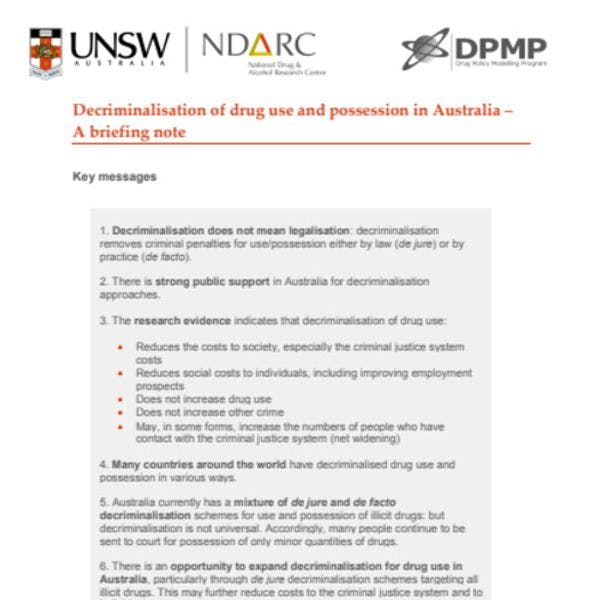La descriminalización del uso de drogas es una política de salud pública sólida y pragmática, afirma el Centro Nacional de Investigación sobre Drogas y Alcohol de Australia
El informe del Centro Nacional de Investigación sobre Drogas y Alcohol de Australia arguye que la descriminalización del consumo personal y la posesión de drogas no solo ahorra fondos públicos, sino que también tiene beneficios significativos para la salud pública.
Más información, en inglés, está disponible abajo.
Suscríbase a las Alertas mensuales del IDPC para recibir información sobre cuestiones relacionadas con políticas sobre drogas.
Decriminalisation of personal drug use and possession not only saves public money, it has significant public health benefits, according to a report prepared by the National Drug and Alcohol Research Centre at UNSW.
The report, which is being issued by the Centre’s Drug Policy Modelling Program in advance of Thursday’s NSW Cross Party Harm Minimisation Summit, also finds that there is strong public support for decriminalisation approaches, such as directing users into treatment.
Co-author of the report, Dr Caitlin Hughes (pictured), a criminologist and drug policy specialist at the National Drug and Alcohol Research Centre, says that decriminalisation should not be confused with legalisation.
“Decriminalisation removes criminal penalties for use and possession by law or in practice. It does not provide a legal avenue to obtain drugs,” says Dr Hughes. “It is a sound and pragmatic policy, supported by research evidence, that can save public money and offer a more effective and humane response to drug use.”
Australia operates decriminalisation schemes in many states and territories and there has been strong public support for such schemes. Australia already has a mixture of de jure (in law) or de facto (in practice) schemes, yet many people continue to be arrested and sent to court for possessing only minor quantities of drugs, according to the report.
However Dr Hughes says: “There is a clear opportunity to expand decriminalisation of drug use in Australia and this would be sound evidence-informed drug policy supported by public opinion.”
The 2013 National Drug Strategy Household Survey found that a majority of Australians supported a variety of decriminalisation measures for people found in possession of small quantities of cannabis, ecstasy, heroin or methamphetamine. Just over 88 per cent of respondents supported decriminalisation of possession of cannabis for personal use, with 42 per cent believing cannabis users should be cautioned or no action taken. Around 65 per cent of Australians also favoured a decriminalisation approach to use and possession of small quantities of heroin or methamphetamine but were more likely to support users of these drugs being diverted into treatment programs.
“There is clearly a strong public health benefit to people who use drugs being diverted away from the criminal justice system and this is not a radical idea – it is already happening,” says Dr Hughes. “The research evidence also indicates that decriminalisation reduces costs to the criminal justice system and improves social outcomes, such as increasing the likelihood that people who use drugs remain in or enter the paid workforce.
“In contrast, there is no evidence that decriminalisation increases drug use or crime,” she adds.
Drug Policy Modelling Program Director Professor Alison Ritter will facilitate the NSW Cross Party Harm Minimisation Summit tomorrow (Thursday 11 August) at Parliament House, Macquarie Street, Sydney.
Keep up-to-date with drug policy developments by subscribing to the IDPC Monthly Alert.
